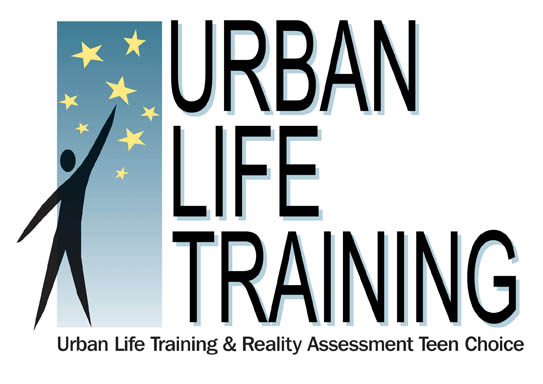- Details
- Category: Urban Life News
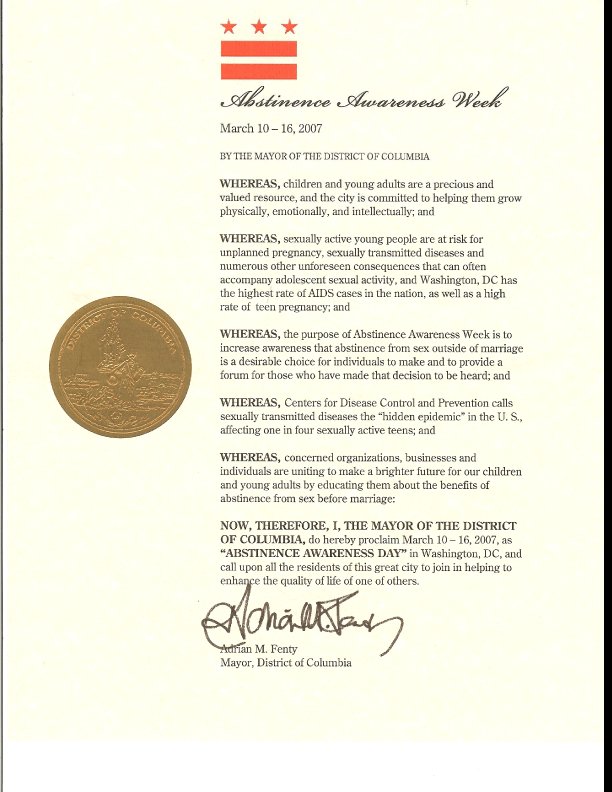
Teens Choose Character, Not Condoms
By Lyndia Grant
All Nations Baptist Church
WI Contributing Writer
Thursday, August 30, 2007
Marcus Barnes, a high school student, participated in a presentation conducted by Ultra Teen Choice, an Urban Life Training & Reality Assessment Teen Choice Education and Peer Counseling Club.
I’m not ready for a child. I’m not ready for my body to be sick with HIV/AIDS and other such diseases at this young age. I want a long life, and I think this program is great!” he said.
Lakia Merriweather said, “I’m too busy to baby sit. I don’t have time for it. This program helps me to keep my head straight. It’s good.”
These are comments made by high school students from Eastern High School who have decided to abstain from sex until they’re married, or at least, they said, “Until we’re old enough to make responsible decisions in this matter.”
The members of Ultra Teen Choice have decided they will respect their bodies as the temple it is, as indicated in 1st Corinthians, 6:19 which says “Know ye not that your body is the temple of the Holy Ghost.”
A very special guest, Miss District of Columbia Rita Sinha, was among this elite group. She speaks around the country, telling her story of how she has lived a life of abstinence. And she’s only 24-years-old!
“I’m saving myself for my husband. In fact, I decided as a young girl to become celibate,” Sinha said.
“There is so much emotion that comes along with sex, and I plan to go to law school this fall. Many of my friends have allowed some guy or girl to get inside their heads, but I believe that when you wait, you will meet who is destined to be your spouse.”
Milton Meza, another member of this group said, “There’re not enough people out here with good advice, and there’s lots of peer pressure. I don’t want to have babies early and have to work two jobs when I can barely support myself. I don’t want my Mom to support my child. I want to take responsibility.”
Nicole Jefferson, another member, said“I’m around others like me who have also chosen a celibate lifestyle, so I don’t feel any different. I’m not ready for the responsibility required for kids, and I don’t want kids to stop me from my goals.”
Richard and Stacey Urban, founders of “Ultra Teen Choice,” have as their slogan, “Character, not condoms.” During the recent presentation held at the Urban’s home, astounding statistics were given about the District of Columbia on the latest status of HIV/AIDS.
Richard Urban reminded everyone that it takes seven years before symptoms of HIV appear. His statistics further showed that 50 percent of the students in the District of Columbia have contracted sexually transmitted diseases, with chlamydia at the top of the list.
There was some good news.
“There has been a 16 percent decrease in teen sex in the United States over the past two years, and 54 percent of U.S. teens are not having sex,” Richard Urban said.
Richard Urban quoted the following statistics: 35 percent of teen girls become pregnant at least once and 66 percent of sexually active teens regretted having sex and wished they had waited.
Wouldn’t it be great if the majority of students in high schools throughout the District of Columbia were members of such a group as Ultra Teen Choice or other such groups that teach abstinence? Wouldn’t it be simply marvelous if this celibacy thing just kind of caught on?
It would be marvelous if girls were not having sex, having babies, or dropping out of school to care for babies when they don’t even know how to care for themselves yet.
A special thank you goes out to Mayor Adrian Fenty for proclaiming the week of March 10-17, as Abstinence Awareness Week. Let’s do it again!
- Details
- Category: Urban Life News
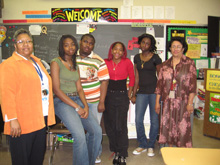
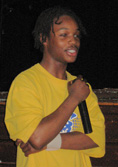

Abstinence is the First Choice
By Queshonda Moore
WI Contributing Writer
Thursday, March 22, 2007
Kasey Davis, 12, and Bryan Buchanan, 27, have three things in common. Both are African American, youthful, and virgins.
Davis is a 7th grader at Stuart Hobson Middle School. His friends think he is crazy for not wanting to have sex, but peer pressure is not an issue for him. “It makes me want to be the leader,” he said. “I am not trying to follow anybody.”
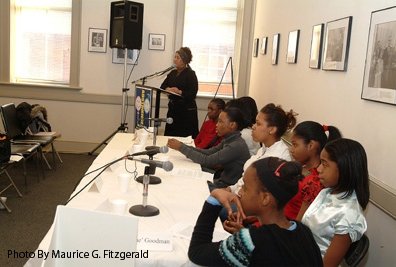
Jonetta Rose Barras, columnist, author and WAMU-FM political analyst, host youth forum on: "Why Abstinence Matters." The forum, held at the Thurgood Marshall Center for Service and Heritage in Northwest, was held to kick off Abstinence Awareness Week, March 10-16.
|
Buchanan stands and reminisces on the days he was standing in Davis’ shoes. He recalls that he did not have an answer to give to his friends because of his experience. |
- Details
- Category: Urban Life News



Teenagers urge peers to abstain from sex
By: Keyanna Butts/Contributing Writer
Posted: 3/11/07
Spreading the gospel of sex abstinence is a challenge seventh grade Cameron Tate readily relishes. There are strong reasons for keeping away from sex, the Stuart-Hobson Middle School student writes in an essay contest for Abstinence Awareness Week which is March 10 through the 16th. He wants teenagers to understand that sex may bring pregnancy, HIV and other sexually transmitted diseases.
"If you're a teenager in school, the baby would distract you while you're studying," the Northeast D.C. student writes. He said that since he's abstinent, it's easier for him to concentrate on his schoolwork and get good grades. If I had a child, I would struggle through school and might not graduate from high school," he says. "My life is care free. There are no disadvantages in being abstinent."
Tate and other members of Ultra Teen Choice, a local teen peer-counseling program, are taking a stand for abstinence. On its Web site, the group notes that 50 percent of teenaged girls in the District will get pregnant at least once, while no teenager abstaining from sex will get pregnant, contract HIV, or have any other negative consequences of sexual activity.
The teenagers will encourage their peers to wait until they are married to have sex during Ultra Teen Choice's second annual Abstinence Awareness Week.
"A lot of young people don't know that abstaining from sex is an option and that you can live without having sex until marriage and that it is a desirable choice," said Ade Ademisoye, a sophomore at Eastern Senior High School in Northeast D.C. and youth president of Ultra Teen Choice. ""This is a good way to get the message out there: that abstinence is important."
Ultra Teen Choice is the committee host for Abstinence Awareness Week, which will be held at various locations throughout the week.
The week's agenda will include question-and-answer sessions, skits, songs, dance routines and testimonies. Special guests include author and WAMU-FM radio personality Jonetta Rose Barras and local recording artist Mark Greene.
Co-founded in 2003 by Richard and Stacey Urban, Ultra Teen Choice provides programs and activities for middle and high school youth that promote healthy lifestyle behaviors and character-based decision making with an emphasis on abstaining from sex until marriage.
"We put a standard out to the kids, that they should be abstinent until they're married," Richard Urban explained. "It is directive and character based, so that is the expected standard that they have. We do not promote or demonstrate contraceptive use."
For Abstinence Awareness Week, Ultra Teen Choice has partnered with community organizations such as the D.C. Healthy Marriage & Relationship Coalition, Amerigroup, Concerned Black Men, Christian Love Baptist Church and East Capitol Center for Change (ECCC).
"I'm excited about Abstinence Awareness Week," said Melissa Higgs, ECCC youth health and abstinence educator. "It will be beneficial for the city and for young people. There is so much pressure from the media, peers and the environment. We just hope to plant a seed in the minds of youth, giving them another option and another way of thinking."
Aside from informing and encouraging youth about abstinence, organizers also hope to advocate change in District legislation. Urban explained that the District budget contributes very little to programs, which teach youth to abstain from sexual relations until marriage.
They may have an ally in the new mayor, Adrian Fenty, who has declared March 10th-March 16th Abstinence Awareness Week.
A selected group of youth will talk to six council members and explain the importance of abstinence, abstinence programs and clubs in the District. Organizers hope that this will emphasize the necessity for more legislative support and funding toward abstinence programs and clubs.
So far the Ultra Teen Choice has four abstinence clubs at one high school and three middle schools in D.C. Each club has about 15 members.
"Youth need and deserve our support," Urban said. "With the really high rate of HIV/AIDS in the District, and with teen pregnancy rates reaching 50 percent in the District, I think we need a strong track for kids who want to stay abstinent. And I think the District government needs to fund that."
© Copyright 2007 The District Chronicles
